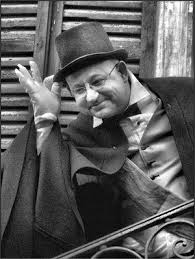
记忆方法
记忆“impresario”可以采用以下方法:
1. 分解法:将单词拆分为“im-press-ario”。联想“impress”意味着给人留下深刻印象,而“ario”则带有意大利语后缀,让人联想到“意大利”,于是可以想象一个在意大利留下了深刻印象的人,这个人就是“impresario”。
2. 图片法:构造一个形象的画面,比如一个穿着华丽服装的意大利人(由于“ario”联想到意大利),他手拿剧本,负责管理一场盛大演出,这个角色就是“impresario”。
3. 联想法:结合“impress”这个词,想象一个“impresser”(印象专家),这个词演变成为“impresario”,即印象管理者或组织者。
1. 分解法:将单词拆分为“im-press-ario”。联想“impress”意味着给人留下深刻印象,而“ario”则带有意大利语后缀,让人联想到“意大利”,于是可以想象一个在意大利留下了深刻印象的人,这个人就是“impresario”。
2. 图片法:构造一个形象的画面,比如一个穿着华丽服装的意大利人(由于“ario”联想到意大利),他手拿剧本,负责管理一场盛大演出,这个角色就是“impresario”。
3. 联想法:结合“impress”这个词,想象一个“impresser”(印象专家),这个词演变成为“impresario”,即印象管理者或组织者。
以上内容由AI生成, 仅供参考和借鉴
中文词源
impresario 剧院经理
来自意大利语impresa,承担,从事,来自im-,进入,使,-pres,缩写自prehens,抓住,词源同prehensile,comprehension.即从事的事业,特指与戏剧相关的事业,后引申词义剧院经理。
英语词源
- impresario
-
impresario: [18] Impresario has no etymological connection with ‘impressing’ people (often though it is mistakenly spelled impressario). It was borrowed from Italian, where it was a derivative of impresa ‘undertaking’. This in turn came from the verb imprendere ‘undertake’, which goes back to a hypothetical Vulgar Latin *imprendere (source of the archaic English emprise ‘enterprise’ [13]), a compound based on Latin prendere ‘take’. Hence an impresario is literally someone who ‘undertakes’ something.
- impresario (n.)
- 1746, from Italian impresario "operatic manager," literally "undertaker (of a business)," from impresa "undertaking," fem. of impreso, past participle of imprendere "undertake," from Vulgar Latin imprendere, from assimilated form of in- "into, in, on, onto" (see in- (2)) + prehendere "to grasp" (see prehensile).
权威例句
- 1. He would first have to learn the Italian, engage an impresario, make contacts.
- 他先得学意大利语, 找一个经理, 签合同.
- 2. The impresario will present an expanded series of concerts next season.
- 下个季节将举办一次大型的系列音乐会.
- 3. The impresario had buttoned his astrakhan coat.
- 乐团经理扣好了羔皮外套.